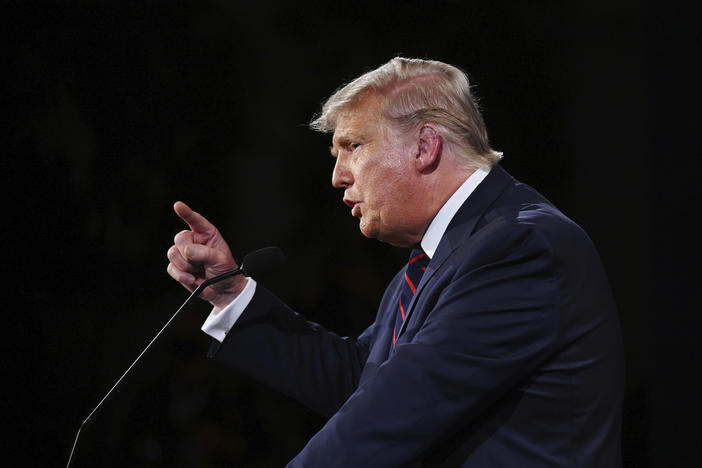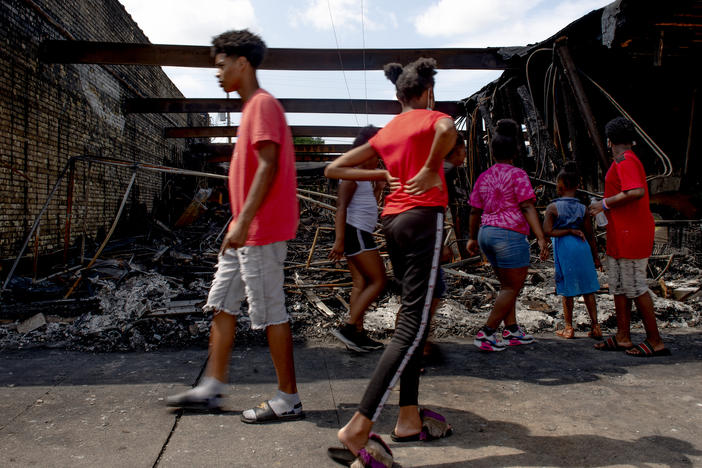Section Branding
Header Content
Democrats Blame Trump Rhetoric For Michigan Governor Kidnapping Plot
Primary Content
Updated at 9:51 p.m. ET
Democrats on Thursday made it clear they felt President Trump was at least in part to blame for an alleged scheme to kidnap the governor of Michigan, citing the president's divisive rhetoric that has often found support among white supremacists and other hate groups.
The FBI said it had foiled a plot by militia members to kidnap Gov. Gretchen Whitmer, a Democrat, and take her to a secure location in Wisconsin for "trial." Six men have been arrested and are facing federal charges. In a coordinated move, seven more people with ties to a far-right militia group are facing state charges in Michigan pursuant to the state's anti-terrorism act.
In a Thursday press conference, Whitmer thanked law enforcement for their efforts to bring "these sick and depraved men to justice." She also pointed to language by the president, particularly Trump's recent refusals to condemn white supremacists, as inciting this sort of political violence.
"Just last week, the president of the United States stood before the American people and refused to condemn white supremacists and hate groups, like these two Michigan militia groups. 'Stand back and stand by,' he told them. 'Stand back and stand by.' Hate groups heard the president's words not as a rebuke but as a rallying cry, as a call to action," she said.
Whitmer was referring to one of Trump's responses in the Sept. 29 presidential debate in which he declined to condemn white supremacy. After days of criticism, he did condemn white supremacist groups in a TV interview.
There was not any evidence that those involved in the alleged kidnapping plot were motivated by Trump, but Whitmer accused the president of legitimizing the actions of violent hate groups through his rhetoric.
"When our leader speaks, their words matter. They carry weight. When our leaders meet with, encourage, or fraternize with domestic terrorists, they legitimize their actions, and they are complicit. When they stoke and contribute to hate speech, they are complicit."
On Thursday evening, Trump tweeted praise for the Justice Department for its work in thwarting the alleged plot. "I do not tolerate ANY extreme violence," he said. "Defending ALL Americans, even those who oppose and attack me, is what I will always do as your President!"
White House press secretary Kayleigh McEnany on Thursday accused Whitmer of "sowing division" in her remarks.
"President Trump has continually condemned white supremacists and all forms of hate. Gov. Whitmer is sowing division by making these outlandish allegations. America stands united against hate and in support of our federal law enforcement who stopped this plot," McEnany said.
Whitmer and Trump have been frequent critics of one another in recent months, sparring over the coronavirus crisis and how best to resolve it.
In April, protesters frustrated with Whitmer's stay-at-home order, some armed, entered the state Senate gallery and tried to access the House chambers.
The next day, Trump said Whitmer should "give a little" and that the protesters "are very good people, but they are angry."
Earlier in the month, he tweeted "LIBERATE MICHIGAN," along with other states — an apparent opposition to governors' stay-at-home orders.
Former Vice President Joe Biden, who hopes to unseat Trump in the Nov. 3 general election, also sought to connect the president's rhetoric to domestic terrorism.
"White supremacists and these militias are a genuine threat. I've got to compliment the FBI and the police agencies for what they did and how they stepped up. But look, the words of a president matter," Biden said.
"They can cause a nation to have the market rise or fall, go to war or bring peace. But they can also breathe oxygen into those who are filled with hate and danger. And I just think it's got to stop. The president has to realize the words he utters matter."
Biden said both he and his running mate, Sen. Kamala Harris, had spoken to Whitmer about the incident.
Copyright 2020 NPR. To see more, visit https://www.npr.org.
Bottom Content




